While partially living in Portugal to research a play, Cori Thomas became curious about work abroad. Cori has not had any overseas productions except for a reading in Italy of play translated into Italian, so she held a roundtable with colleagues— Edward Einhorn, Sam Max, Crystal Skillman, and Andrea M. Stolowitz—who had either had plays produced or had even directed or produced work throughout Europe. Their conversation parses the differences in new play development and theatregoing cultures among the United States and Germany, Italy, the United Kingdom, and the Czech Republic.
Four Playwrights from the United States on Working in European Theatre Cultures and Economies
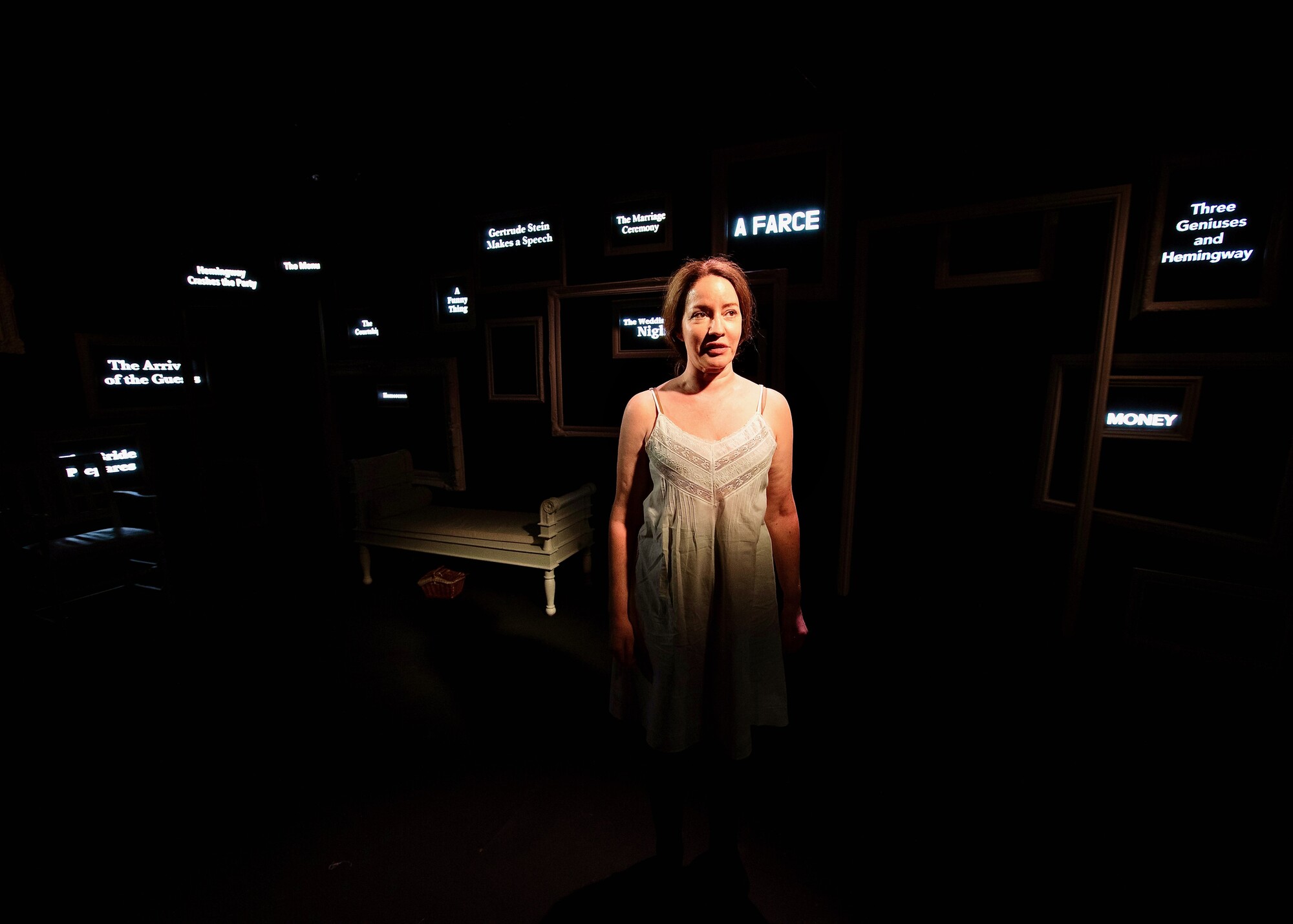
Alyssa Simon The Marriage of Alice B. Toklas by Gertrude Stein at the Jermyn Street Theatre. Written and directed by Edward Einhorn. Scenic design by Machiko Weston. Costume design by Anna Lewis. Lighting design by Ali Hunter. Sound design by Mark Bruckner. Photo by Ali Wright.
Cori Thomas: I'm really thrilled that you all are here. Each of you can start by telling us what country or countries you had you've had something produced in, and give a little intro to the process and how it was.
Crystal Skillman: I had two overseas opportunities. The first occurred in 2022. Through the commercial producers Drew and Dane Productions, who are at the helm of Rain and Zoe Save the World, my play with music that now Jared Mezzocchi directs, and Bobby Cronin did the music for, we had the opportunity to be a part of Jermyn Street Theatre's season in London in 2022.
Then, through the help of Meghan Finn at the Tank, an Italian festival called In Scena! [On Stage!] did a tour of OPEN—my play, a magic show without magic about the love of two women–in four cities in Italy. This has resulted in a great friendship. They just had their festival here, where Italians come over and produce their work. As an Italian American, I helped mentor an Italian playwright.
Sam Max: I primarily live in New York. I have a kind of circuitous relationship to my work happening in Germany, both as a playwright and as a director in the state theatre system, which is a specific arts subculture that's very well-resourced and government funded. That's where I practice mostly as a writer and a director right now. And I haven't actually been, but I've had projects happen in Beijing as well.
Andrea M. Stolowitz: I've worked also in Germany a lot, not in the state theatre system, but in the very well-funded freie Szene, which are the smaller independent theatres. I've developed a relationship with an artistic director at a theatre in Berlin, so I continue to work with that person on various projects.
I am in the middle of a project in Ireland that's supported by the Abbey Theatre, which is the national theatre of Ireland—again, the state funding model—and also supported by the Irish Arts Council, which is the state funding for artists and art projects in Ireland.
I've worked in Lebanon on a devised ensemble project, and that was really interesting and funded by the United States State Department.
Edward Einhorn: The two places I've had a relationship with are London and the Czech Republic. My play came in right after Crystal's at the Jermyn Street Theatre. My play The Marriage of Alice B. Toklas by Gertrude Stein was being produced by James Simon Productions. I'm going to do something again with them next season.
I also had a production of a one-act opera at the Asylum Chapel, which is a really incredible space, another thing at the Wigmore Hall that was opera-related, and a couple of pub theatre short pieces.
With the Czech Republic, it has been an ongoing relationship since I did a festival of all of Václav Havel's plays in 2006 in New York. Recently, I brought a filmed version of a play I directed, The Last Cyclist, to the Václav Havel Library in Prague. My main association with that region is that I curate a theatre festival of plays coming from there, which is called Rehearsal for Truth International Theatre Festival.
Cori: We can start with Germany. How in the world did you end up having productions in Germany?
You wouldn't expect to develop a new play in the same way that you would here, especially in the state theatres. Plays are considered text: they can be massaged and moved.
Sam: My first contact with Germany was through a program that is related to Theatertreffen, which happens every year in Berlin. There's a satellite program called the Theatertreffen Stückemarkt that historically has been a place for five international authors to come and present their work to the German-speaking regions for the first time. They put my play into translation, and it was presented to the public there in a staged workshop by a German director named Charlotte Sprenger.
For playwrights who want to have contact with Germany, this program tends to be a strong path, especially for younger, emerging artists like myself. I think Germany, especially within the last couple of decades, has become increasingly open to international voices and authors. It has not been the case historically, because of the German theatre's fixation on nation-building and its role in civic society.
Through my participation in the Stückemarkt, I was contacted by Suhrkamp Verlag, which is one of the leading publishers of European literature. I began working with them, and it was through that process that I was assigned an editor, or Lektor/in, with whom I began an ongoing writer-editor relationship. This structure of working is uncommon for playwrights in the States. Typically, we have reps who are peripheral to the development of our work, but in Germany these editors in the agencies look at drafts constantly and help me understand my topics and my approach.
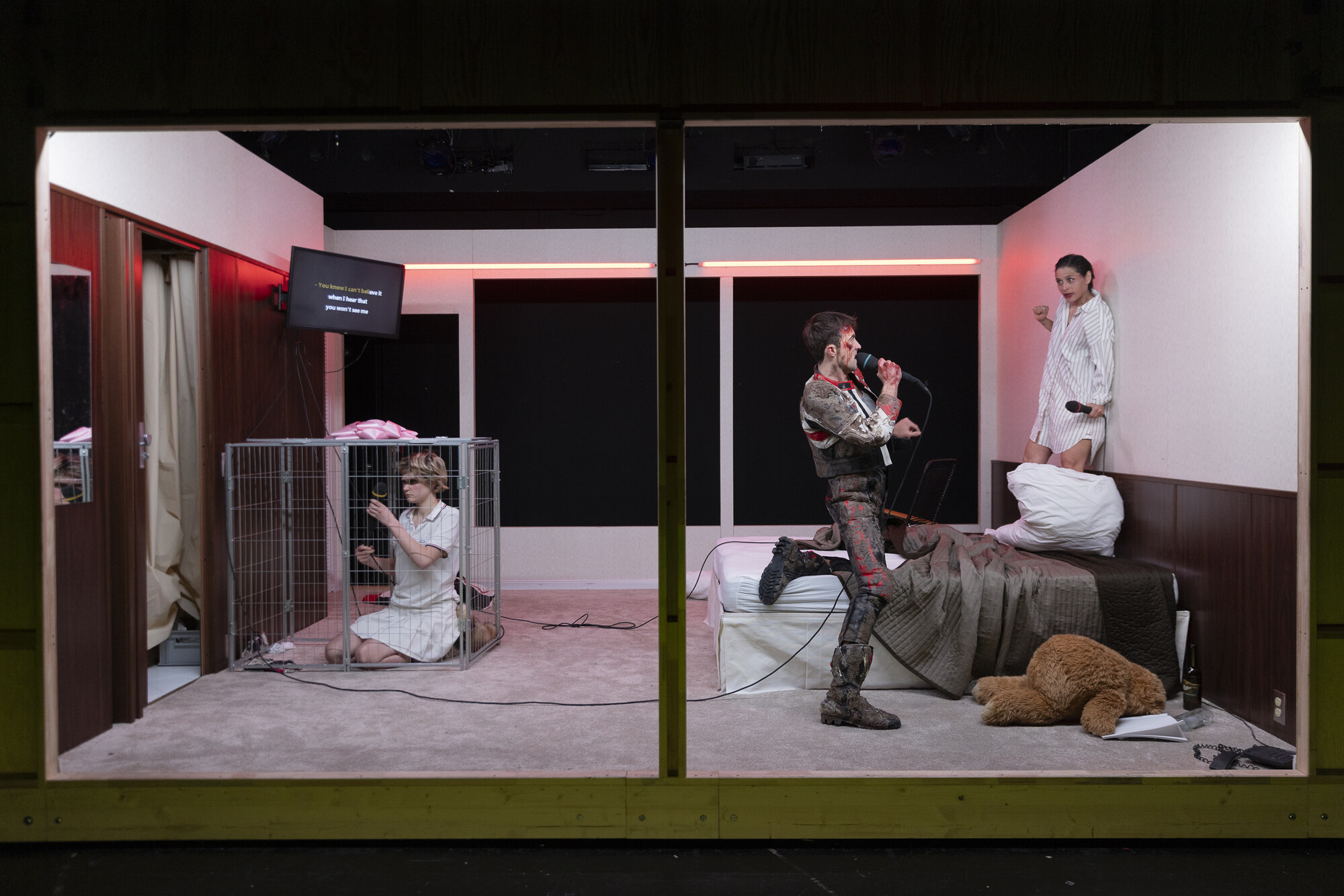
Mathilda Switala, Jakob Gühring, and Natali Seelig in Wüste [The Holes] at Deutsches Theater. Written and directed by Sam Max. Scenic and costume design by Matthias Nebel. Lighting design by Peter Grahn. Dramaturgy by Karla Mäder. Photo by Jasmin Schüller.
Cori: How did you get connected to German theatre, Andrea?
Andrea: I lived on and off in Berlin for several years in the nineties and the early aughts. There was, as Sam Max was saying, a movement from the civic duty of German theatre to a much more international movement. A lot of that international movement is in English.
This particular theatre that I got involved, English Theatre Berlin, in works entirely in English. This theatre was founded originally as a way for people whose native language was English to be working in English, and then it’s turned into an international performing arts center. When I got involved in 2014, I had a particular project that I was being funded for. It ended up being my play The Berlin Diaries, which now has five productions next year and has been produced in Germany three times. They were very hands-on in a nurturing way. Because of that artistic director, who was really engaged in the work for no other reason but to support me as an artist, I made this play that now is a defining feature of a way that I work, which is very interview-based.
Opposite to Sam's experience, I'm not in the state system, but they are heavily funded by the government. On all levels of big state theatres all the way down to the smaller free theatres, people are funded.
Also, the theatres are full. I flew in last year for one of my performances, and it was packed and buzzing, and people were on the wait list. I thought, "What planet am I on?"
Cori: I wanted to ask about the aesthetics there. How is that translation from what your experience is in theatre here to there?
Andrea: It's a primarily director-driven medium. You wouldn't expect to develop a new play in the same way that you would here, especially in the state theatres. Plays are considered text: they can be massaged and moved.
The theatre that I was working with, because of its freie Szene status and its interest in new plays, had a way of working that was adjacent to the way we work here, where there was respect for the text. So mine was maybe a cousin to what we have.
In America, we are not a culture that has a healthy relationship to the arts. We're constantly relearning and re-educating.
Sam The American new play development system is very specific in terms of how it functions, and actually it’s very special. It is so focused on the writing, and it is so focused on the betterment of the play as a written piece of language. The German state theatre system has a very literary quality to it, but there's not a very profound sense of how new plays are developed.
It's fairly typical, because of the culture around directors there, that the directorial concept is usually in some way rubbing against, or countering, or disagreeing with, or irritating the source text of the play. The longer I've been there, the more I see directing as a form of writing. Those practices—directing and writing—are not necessarily seen as separate.
Americans aren't so trained in this—to tease out the words from the production. The German audiences appreciate having these associations opened up between the play and the staging, and that's a major aspect of the art form there. They have a totally different watching practice.
My last thing on the subject is that Germany is an amazing place aesthetically for a lot of different reasons. It's really not a good place for writers who are very fragile or don't have a lot of resilience.
Cori: And want realism.
Andrea: Germans, they just don't dig naturalism. They just don't.
Cori: How is the pay for artists in Germany, compared to what we get paid here?
Sam: The payment structure works in a similar way to how it works in the United States, which is that an artist has to establish their market value in a given ecosystem before expecting to be able to live off a certain amount of money. That's a constant conversation between the writer, the agents, and the theatres. And they're German, so they have very frank discussions about this. These are real, practical conversations that I think an artist has to get used to having.
I will say I can live pretty comfortably in Germany solely on the commission. And in Germany you're paid okay as a writer; you're paid way, way better as a director. My directing fees are double what my writing fees are, even if I'm writing a completely new play as a part of the same production.
Andrea: I mean, health insurance isn't the expense that it is here. The entire society functions differently. You'll be subsidized by the German government as an artist, so much so that if you earn below a certain amount, the government is paying your retirement contributions. So, it's a weird thing to compare it.
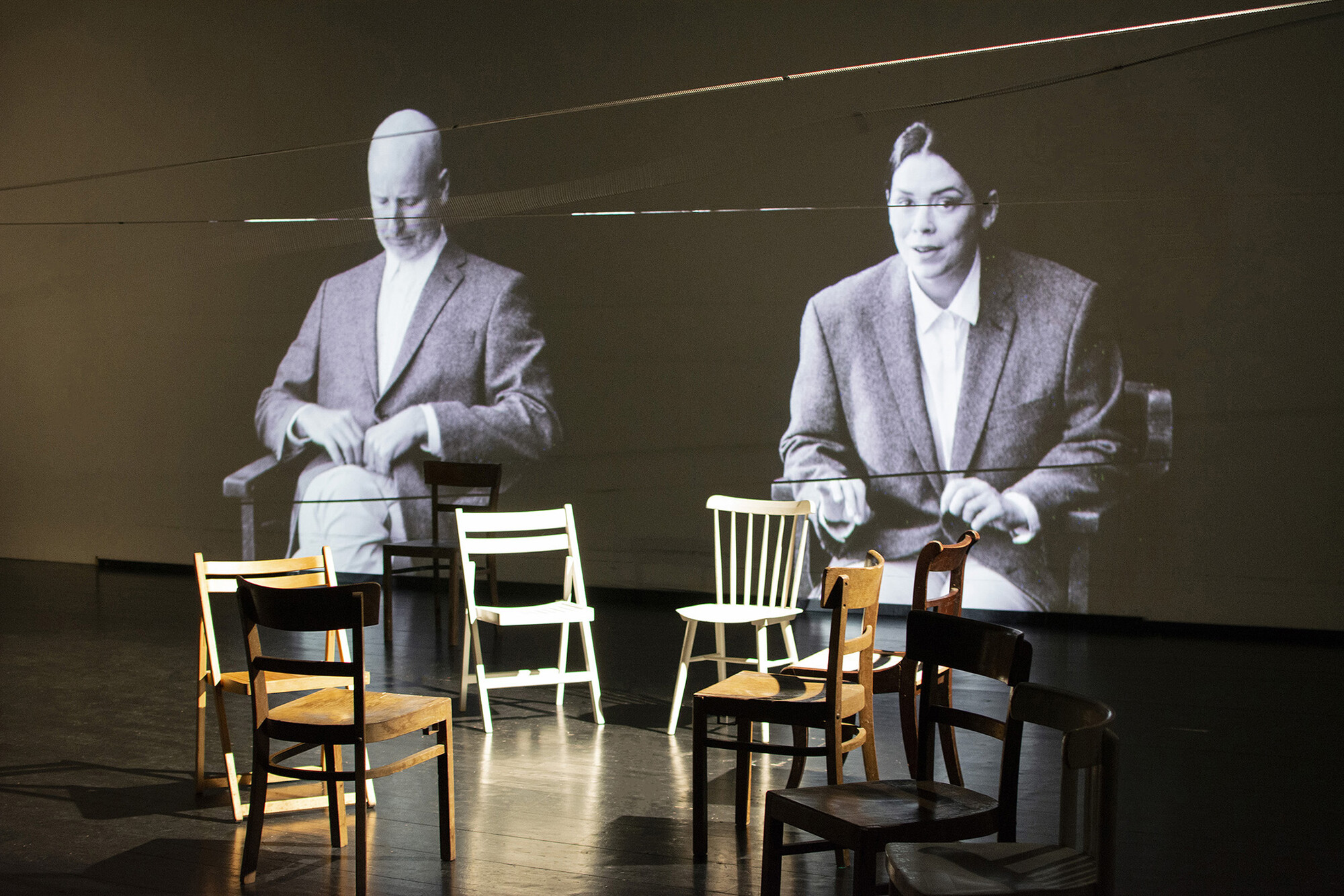
Carrie Getman and John Julian in The Berlin Diaries by Andrea Stolowitz. Directed by Daniel Brunet. Scenic and costume design by Isabelle Kaiser. Lighting design by Christian Maith. Video design by Jake Witlen. Assistant video design by Roman Hagenbrock. Assistant direction and stage management by Rose Nolan. Technical Direction by Torsten Litschko. Photo by Stefania Migliorati.
Cori: Now let us move on to the United Kingdom.
Crystal: Sure. I'll end with Jermyn Street so then Edward can take that ball and move it forward.
In America, we are not a culture that has a healthy relationship to the arts. We're constantly relearning and re-educating. But in any country I'll mention, there is that healthy relationship that Andrea mentioned. The theatres are full. This is not something that I encounter even here in New York.
In Italy it was very interesting because Italians really put their arts money in fashion and food. So theatre artists and theatre organizations are really fighting for that money and very vocal about it. They really do have to shake the government down.
It got my heart pumping, because I'm here with all these Italians. "Got to get that money. We're going to do a great show. We're going to re-up theatre in Italy." And that passion was beautiful, and they bring that passion with their Italian artists here in New York.
In London, that was a very different circumstance in the sense that Rain and Zoe Save the World was ready for its first out-of-town production. In America, even if there was an out of town tryout, it's incredibly expensive. Because the costs are down overseas, a lot of commercial producers look to working in London.
You get to showcase your work. Jermyn Street Theatre in the heart of the West End. It has a great reputation for really cutting-edge work, but also, work that is commercial. You can be edgy and commercial at the same time, which is how I feel.
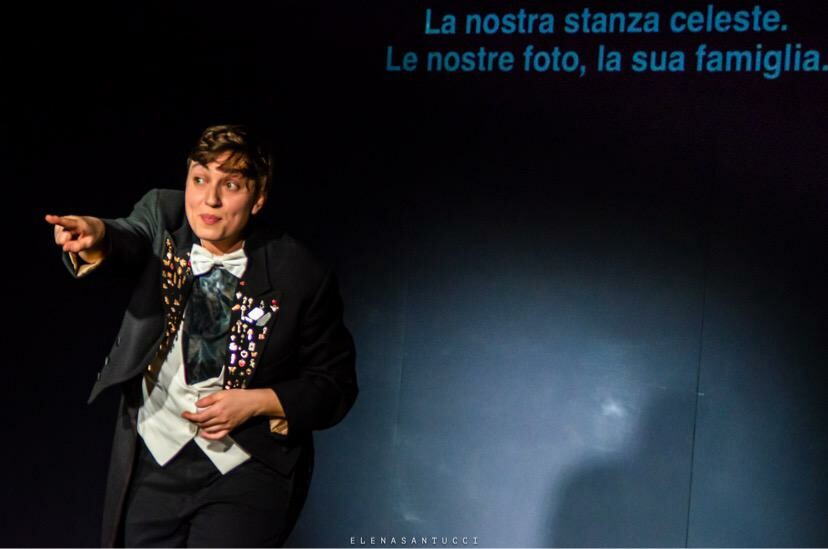
Lily Ali-Oshatz in Open by Crystal Skillman on tour with In Scena! [On Stage!] in Italy. Directed by Jessi D. Hill. Scenic and lighting design by Sarah Johnston. Sound design by Emma Wik. Costume design by Madeline Wall. Dramaturgy by Arne Meeker. Translation by Giulia Pontecorvi. Photo by Elena Santucci.
Edward: Jermyn Street Theatre is a great place to do my show. I don't actually know the budget for the Jermyn Street Theatre. I was paid as a writer, which was, as you hear, not that different. I do think the fact that living expenses are less helps. It also makes things possible for the actors, who can make a living at it. Sort of. But the experience was great.
Stylistically, getting people used to my style, which I realized was very New York, was a whole thing. On the other hand, it was a very supportive world, and the actors were great people. People were excited about theatre in London.
My other shows in London are quirky. The pub theatre scene is a little bit like our Off-Off-Broadway/indie theatre. It's fun, bare bones. Nobody's making any money. I got a nominal fee.
So, that was my experience in London. Obviously, I liked it enough that I'm going back. I'm excited to go back.
The Czech Republic is very different. I mean, the fees there are relatively thin by our standards, but the living expenses are relatively tiny by our standards.
The Czech Republic particularly has that tradition that comes from Václav Havel, and playwrights are still important in their world. It's interpreted, but it's still... It feels like you're putting on the play with an interpretation.
To give you a sense of it, the last time I was there, I taught at their theatre institute What people were saying to me is that, nowadays, people are looking at script dominant productions as almost old-fashioned. The aesthetic is moving, I think, being moved by the European impulses. It's interesting, because all the Czech work that I am familiar with is relatively standard in terms of the American mindset of, "There's a script. There's a production." In my discussions to get my work done there recently, I've been trying to suss out what the aesthetics of these various theatres are.
It's our responsibility, if we're going to work in this tradition, to have an eye on one's own work from a global perspective.
Cori: Is there anything that anyone would like to add that would be important for somebody who has never done something overseas?
Crystal: Yeah, I've been dismayed how little Americans know international work. Theatre is international. If you want to dig down deep into this as an artist, you should know the other players.
Sam: Totally. I would add, for an American audience reading this, that there tends to be a sheltered sense of how to make a life in the theatre. I see myself as a living example of the fact that you can sustain a life in the arts if you look outward, make connections with other arts economies in different countries, and foster those relationships.
It's possible. It's a tried-and-true tradition for fine artists, who are represented in multiple countries, work in multiple countries, create their work in multiple countries, have studios in multiple countries. It's possible for us to do as writers as well
Also on an art historical level, an artist has to understand that America is actually one of the youngest theatre histories globally. It's our responsibility, if we're going to work in this tradition, to have an eye on one's own work from a global perspective.
Andrea: I'm going to piggyback super quickly on that. European countries have a lot of arts funding for their artists to tour. So you don't have to go to Europe to go to these things. There's a lot of great touring work that comes through New York, because European countries tour
The Schaubühne puts everything on a big barge and sends their huge sets to Brooklyn. If you ask them at the Schaubühne, they're like, "Oh, we've got a barge here going to China. We've got another set going here. We've got another set going here." It's really eye-opening to see and investigate the form and the aesthetic of the art form that we work in.
Edward: Speaking about the other way around, America does not fund international touring. I did this little class in Prague about experimental theatre in New York. Not even that experimental—I mean, Mr. Burns: A Post-Electric Play was among the pieces I talked about. And nobody had heard of anything, nothing. We don't fund that sort of thing, so there's this giant gap of knowledge going on.
For me, it creates a whole opportunity to expand knowledge and bring my work there. I realized, because I've had a couple of articles and things in the Czech paper, they had heard of me more than most playwrights in America—because I engage.
Cori: Well, thank you all so, so, so much for your time and sharing your experience. If we're all part of this big world, we should know a little bit more about what's happening in it, in our field.

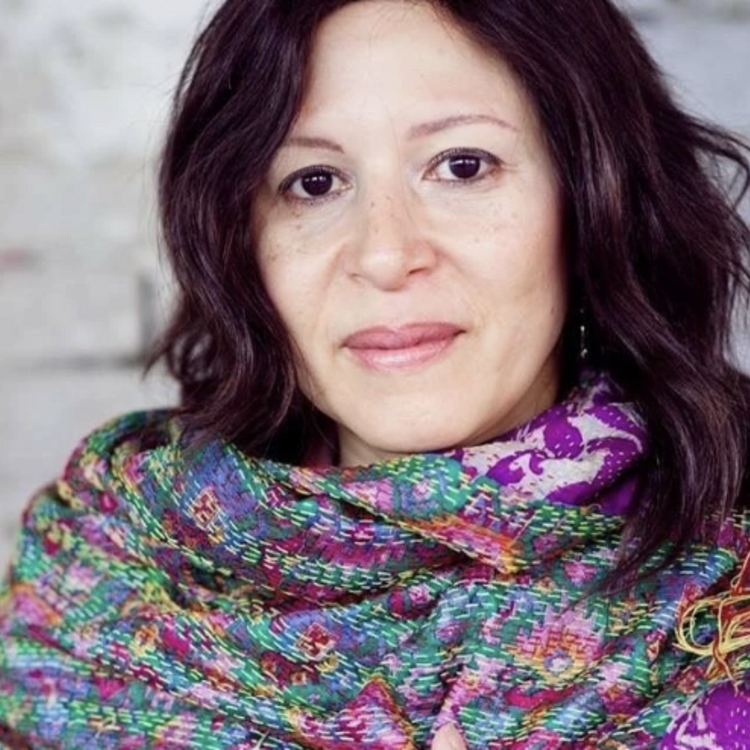
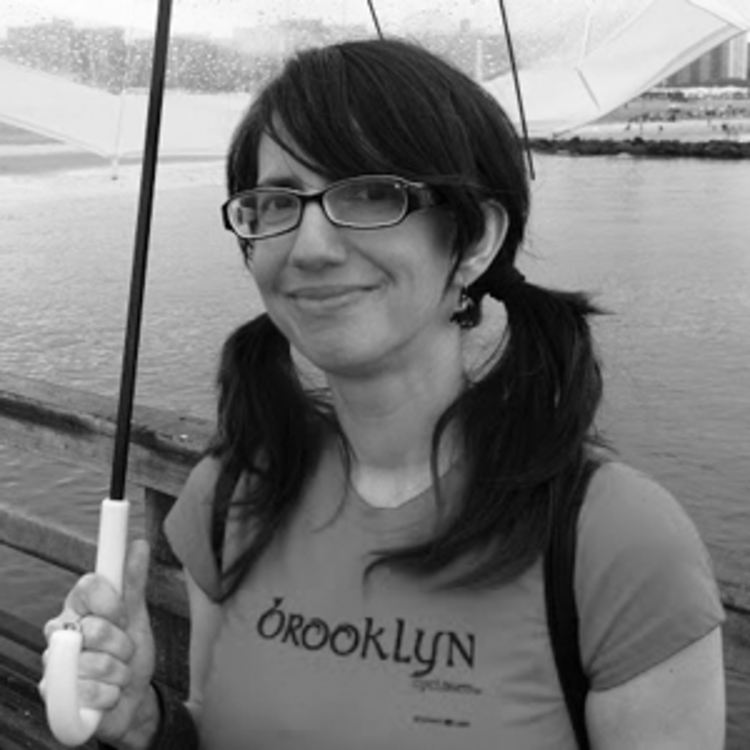
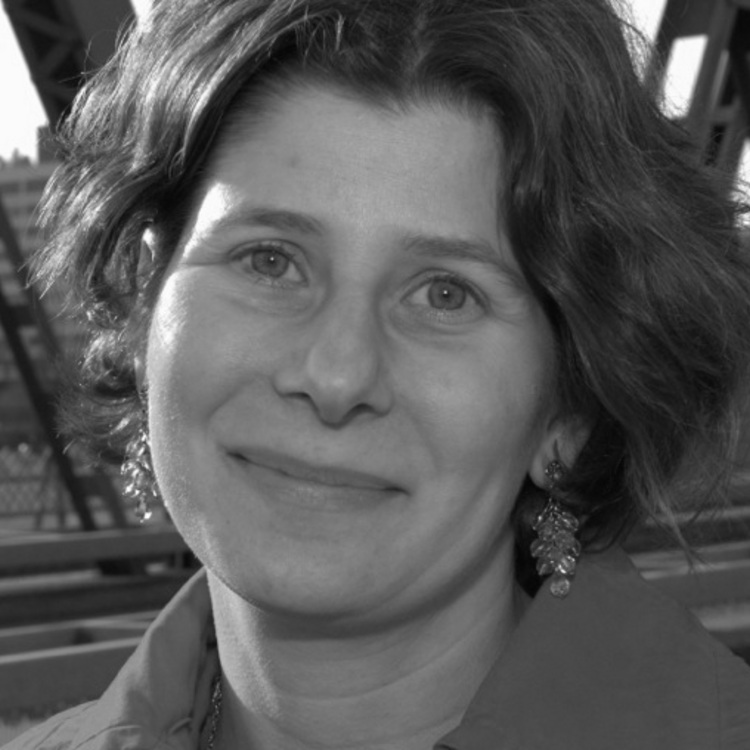
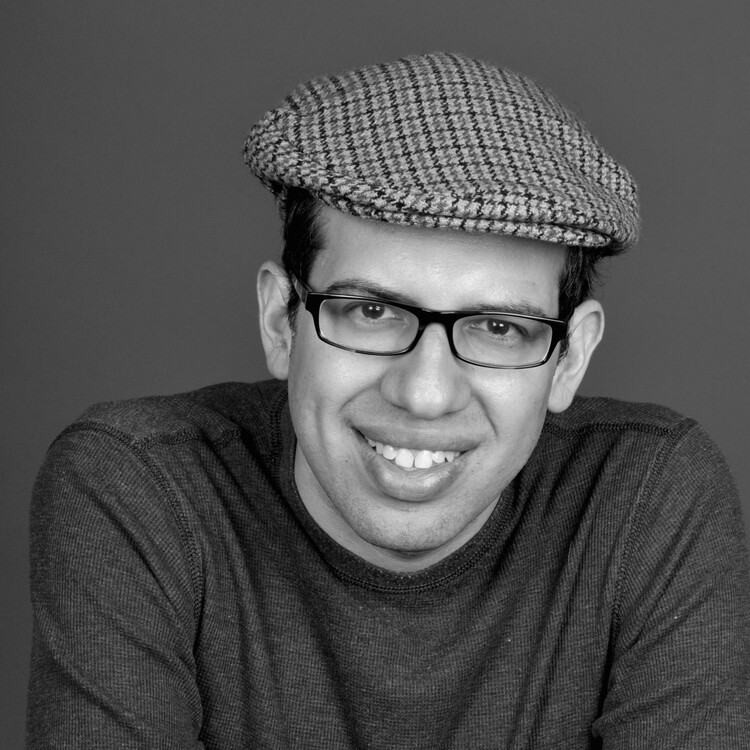
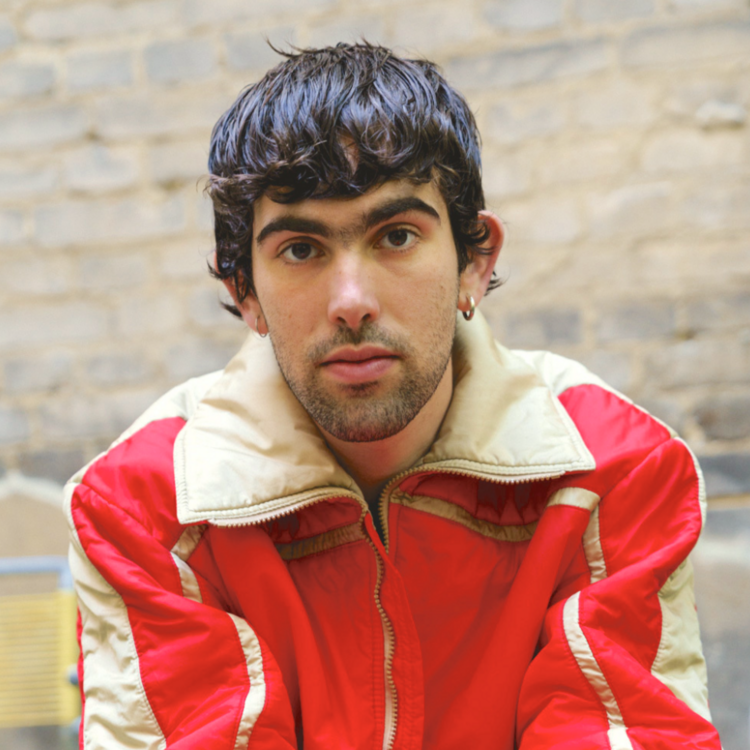
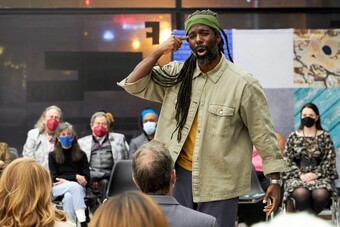




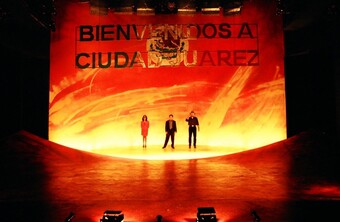



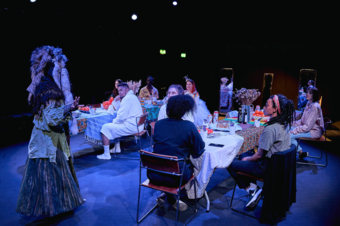


Comments
The article is just the start of the conversation—we want to know what you think about this subject, too! HowlRound is a space for knowledge-sharing, and we welcome spirited, thoughtful, and on-topic dialogue. Find our full comments policy here